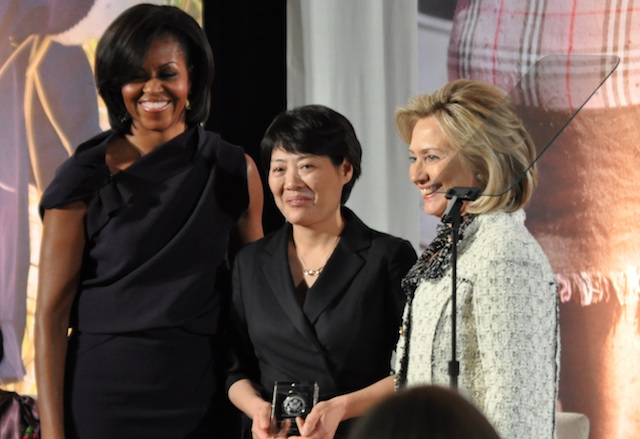Chinese Concerns About Fairness Shake Faith in Government Leadership

U.S. first lady Michelle Obama (L) and U.S. Secretary of State Hillary Clinton (R) pose with International Women of Courage Award-winner Guo Jianmei, a Chinese lawyer and rights activist, at the Department of State in Washington, DC on March 8, 2011. (Roshan Nebhrajani/Medill DC/Flickr)
A recent Pew Research Center survey found that Chinese people are increasingly fond of other democratic political systems while distrustful of their own government. It is hardly news that Chinese citizens vie for "democracy" and "freedom." However, rapid economic growth, rising incomes, and China's increasing power in the world appear to have distracted citizens' attention from immediate political freedom, at least in the short term. But to what extent are the citizens willing to tolerate the government and the Communist Party? When are the citizens compelled to challenge the authorities to ensure their voices being heard? These remain some of the most intriguing questions to China watchers.
The experience of Guo Jianmei, a prominent public interest lawyer and women's rights advocate, may help us examine the changing political climate in China, its impact on citizen activism, and citizen actions challenging the authorities. Inspired by the international women's movement, Guo founded the first legal aid center housed under the prestigious Peking University immediately after she participated in the UN Fourth World Conference on Women in Beijing in 1995. A well-trained young lawyer from the Ministry of Justice, Guo was determined to provide pro bono services to women who needed basic legal support to file divorce and escape domestic violence. Recognizing Guo's contribution to social justice during a time when China was undergoing enormous economic and social transitions, the Chinese government and media praised Guo's work and awarded her publicity and some degree of freedom to expand her legal work. After years of legal representation of the poor and the marginalized, Guo began taking on "cases of significance" — legal cases that challenge the fundamental system in order to set precedents for change — and drew concerns from officials who deemed Guo's work too "edgy." Against this backdrop came China's narrowing space for NGOs and advocacy groups in the mid 2000's. Many observers believe that the so-called "color revolutions" in several former Soviet countries around 2005 further contributed to Chinese authorities' tightened control over civil society. Increased government scrutiny, with tactics such as regular "official tea chats" and "advice" to suspend work and stop receiving foreign funding in order to "avoid unnecessary trouble," pressured Guo to eventually shut down the center at Peking University in 2010.
Today, Guo continues her work through a registered public interest law firm. Without Peking University's "shelter," she has less "protection." Government harassment, unfortunately, continues and as a result, Guo was compelled to be more vocal before the media, including Western media outlets. "They've pushed me over the edge," said Guo. From Guo's perspective, she was simply doing the right thing and was helping her people pursue fairness in a society where justice is rarely served and due process does not exist in the court room.
Guo is not alone. Ai Weiwei, the renowned artist, is another high-profile case widely reported in the media these days. Not many who sacrificed their freedom for demanding the government to address inequality and unfairness have been covered by the international media. Yet those that do represent a large number of people in today's China; according to the Pew survey, Chinese citizens are grappling with "fairness" issues ranging from official malfeasance, food safety, education, workers rights, and income inequality, to the health-care system.
How does the growing distrust in the government affect the upcoming, once-in-a-decade political leadership transition in China? The world awaits the answer in November when top Chinese leaders officially anoint the new leadership. It remains to be seen how China tackles growing citizen discontent during the critical transitions. With uncertainties abounding, one thing seems certain: new leaders of China absolutely need to gain more trust from its people for effective governance. China can no longer afford to ignore citizens' demand; in addition to collective wisdom, fundamental reforms must happen.
ABOUT ASIA SOCIETY'S ASIA 21 YOUNG LEADERS INITIATIVE
As the quickening pace of global change presents new challenges that cross national boundaries, Asia and the United States must look to a new generation of leaders for fresh ideas and imaginative solutions. The Asia Society's Asia 21 Young Leaders Initiative is designed to identify, nurture, and develop these types of leaders across the Asia-Pacific community to foster deep, mutual understanding, build lasting transnational networks, and develop cooperative responses to address shared challenges. Established in 2006, the Initiative now includes a network of more than 700 young leaders representing every country in the region and nearly all sectors, and has become the Asia-Pacific region's leading network for emerging leaders under the age of 40. For more information about all things Asia 21–related, please visit http://sites.asiasociety.org/asia21summit/.


